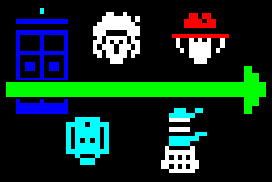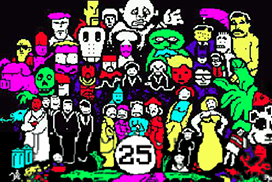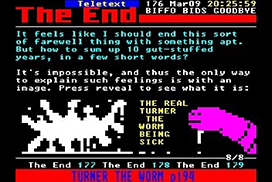
Grumble feature enabled

|
Change is in the air
Edge #176, June 2007
A wise man once said that nothing ever lasts for ever. Admittedly, he also said "C-c-c-cucumber, c-c-c-cabbage, c-c-c-cauliflower, men on Mars, April showers, oh oh oh oh", so maybe he was in actual fact a semi-literate knob-end. Nevertheless, change is at hand, and you'd better get used to it.
Who, back in 1992, could have predicted that the glorious Sega empire wouldn't last a billion years? Who, back in 1979, would have believed that within a decade Atari would be all but hobbled, or that home computers would stride past consoles as the gaming format of choice? Who could ever have foreseen the hilarious fall of Commodore, or the formerly glorious computer giant's inept attempts to shore up its failing business with a series of increasingly desperate fumbles for the zeitgeist?
But that's the games industry for you. The one constant is that it's constantly shifting. The balance of power moves and, from time to time, there's a mass extinction event wherein lots of people lose their jobs. Or, at least, are bought out by software giants, and get forced at gunpoint to make cheap and cheerful collect 'em ups based upon lacklustre animated movies starring, I dunno, anthropomorphic pies.
As I write this, business pundits are predicting that the next collapse of the games industry is imminent. Indeed, SCEE has just informed its staff to expect redundancies as it prepares to face up to the challenges ahead. Specifically, the challenges presented by 'a period of transition where some of the fundamentals of our business are changing'. Although, y'know, it might probably, at a push, also have something ever so slightly to do with the fact the "record-breaking" PS3 hasn't exactly set the gaming world ablaze as they'd hope...
Now, I'm no business expert - in fact, I'm some sort of big, drunk, idiot - but I've always felt that the games industry was run by people who didn't really know what they were doing. I'm not going to pretend for a moment that I'm some great gaming guru, but in most cases I've found it pretty easy to predict when we were on the verge of another epoch-making balls-up. The reason I've found it pretty easy is that the people who run the games industry keep doing really stupid things. In fact, there's a heritage of incompetence that stretches from Atari suing Activision, to the 32X, past the 3DO, right up to the mistakes of the modern era.
Couple that to the fact that hardware and software is rendered obsolete every five or six years, and you're faced with an industry built upon a bedrock of boom and bust. Part of the problem is that there seems to be a collective madness among the console giants - the hard-won, quiet dignity of Nintendo aside - to be the biggest, the noisiest, or the most expensive.
The race to have the most powerful hardware has always struck me as not merely a game of willy-waving one-upmanship, but actively counter-productive from a business perspective. I mean, Sony and Microsoft are losing hundreds of pounds for every console they sell. Who would be stupid enough to enter into a market where that happens?
Admittedly, when you've got as much money as they have you can afford to take risks - and we shouldn't forget that, unlike previous market leaders, neither Sony nor Microsoft have all their eggs in just the videogame basket - but the people who suffer, much as they did the last time the market crashed, are the foot soldiers; the developers, and the small publishers.
To wit: the people who make the games to play on the consoles that Sony, Microsoft and Nintendo have made.
With the costs of developing for the new super-consoles so astronomically high, it's unrealistic to develop a single format title and expect to make money on it. For most developers and publishers the only way forward is multi-format strategy - as demonstrated by the all-too-familiar brands in the PlayStation 3 launch line-up - but that just renders a multi-format market utterly pointless.
Not only that, but it makes for a very insecure development environment. The only people with the security to develop innovative titles - step forward LittleBigPlanet (it's innovative, yes, but I'm not convinced it'll be a breakthrough, format-defining hit) - are the ones nestled within the bosom of the hardware giants. And I don't know exactly how healthy that is.
The PlayStation Network, Nintendo's Virtual Console and Xbox Live Arcade are doubtless the early blossomings of the future of software distribution. Hopefully it'll grant some smaller operations the ability to release some novel, low-risk product that can keep them afloat while the big boys battle it out, but I'm certain that we're years away from a point where physical product is entirely done away with. It just isn't yet practical with the incumbent generation of systems.
Still, Sister Change is the handmaiden of the games industry, and there's no point me weeping about it.
Mr Biffo co-founded Digitiser, Channel 4's Teletext-based videogames section, and now writes mainly for television
Do you know of any important moments from the annals of Digi history that have been omitted? If so, then mail me (superpage58@gmail.com) right now, man. Credit will be duly given for anything that gets put up.









